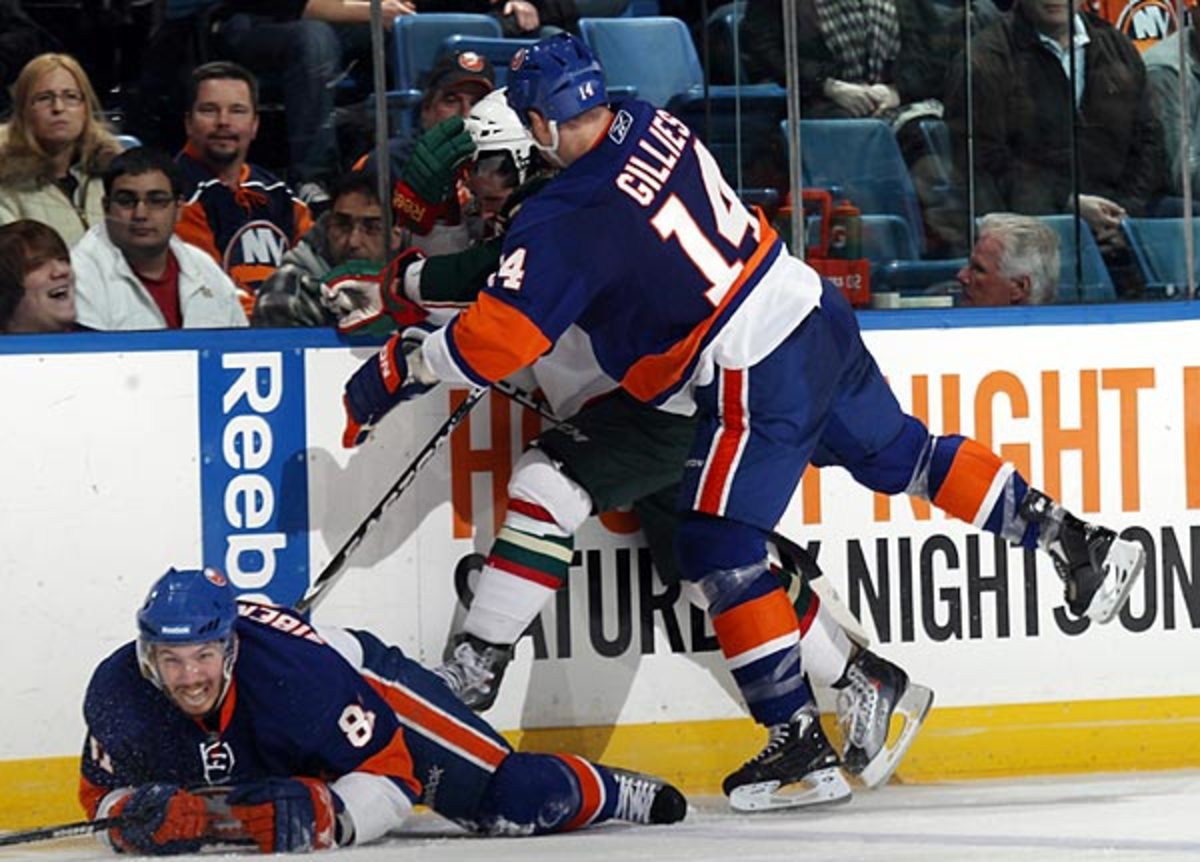
Gillies hit reveals NHL's soft side
It took Trevor Gillies all of one minute and 51 seconds after returning from a nine-game suspension to get himself tossed for this crushing hit on Minnesota's Cal Clutterbuck. (Bruce Bennett/Getty Images)
By Stu Hackel
The research into degenerative brain disease in hockey players caused by repeated blows to the head, as reported today in The New York Times, underscores that while the NHL has done much to reduce head shots that cause concussions, it needs to do a better job implementing some of the steps it has taken.
Both Alan Schwarz's story and Jeff Z. Klein's focused largely on the issue of fighting and how it might lead to chronic traumatic encephalopathy, or CTE, the degenerative brain disease known to cause cognitive decline, behavioral abnormalities and ultimately dementia. But any contact to the head in the sport could cause a concussion and, as is now known, the cumulative effects of more than one can be devastating.
The NHL has taken steps to ensure that concussed players get the necessary recovery period and it continues to explore new ways to diagnose concussions as quickly as possible. The league is fully invested in scientific research to learn as much about the effects of concussions as possible. However, the most visible and obvious area of concern about brain trauma is what happens on the ice and, especially, how the league treats those who willfully target the head of an opponent. In that area, the NHL could do better.
In short, the punishment is too soft -- as it is for most instances of supplemental discipline regardless of the infraction committed. That leniency breeds repeat offenders whereas tougher punishment would serve as more of a deterrent. As we've learned recently, the lack of stern disciplinary measures is not merely the doing of the NHL's Hockey Operations Department, the general managers and the owners. The NHL Players Association has been complicit in keeping the length of suspensions low.
Compounding the problem is that Hockey Ops bases the severity of its decisions on how badly the victim is injured and not the perpetrator's intent. In the case of hits to the head, since concussion symptoms do not necessarily show up immediately, that standard is clearly inadequate to judge how badly a victim has been injured.
A few weeks ago, we mentioned this example of an unpunished elbow to the head, by the Rangers' Brian Boyle on Jaroslav Spacek of the Canadiens ...
...that went unpunished both on the ice and afterward. It's hardly an isolated incident. Fortunately, Spacek was not concussed, but Boyle's drive-by elbow (which was not “coincidental contact," as Craig Simpson put it) is the kind of thing the NHL tolerates too easily. It's symptomatic of a systematic failure to adequately police the game.
The most recent example of that failure occurred on Wednesday night with the Islanders' Trevor Gillies, fresh off a nine-game suspension for his disgraceful actions (jumping into Eric Tangradi from behind, boarding him, concussing him, beating him while he lay on the ice unconscious and then taunting him from the runway after he'd been ejected) in the Feb. 11 Boston game that was without question the season's low point. Gillies rammed Minnesota's Cal Clutterbuck from behind...
...and was given a five-minute major and a game misconduct. When the suspensions came down after the Feb. 11 game, we wrote that the punishment was inadequate and didn't do enough to discourage future acts that cross the line, specifically mentioning that Gillies should have gotten more than the nine games he received for his sorry display. Sure enough, a whole minute and 51 seconds into his triumphant comeback, Gillies gets tossed again. What a surprise.
Even Mike Milbury, who seems to have turned a corner (probably not a sharp one) on dangerous behavior by NHL players, found nothing to like in Gillies' actions, as he stated on Versus later that evening.
[vodpod id=Video.5686845&w=425&h=350&fv=v%3Dhttp%3A%2F%2Fwww.versus.com%2Ftp_flashvars%2FKzg0zkoVQODc1RDuUHgcOfQXmVYljAub%2F314%2F400%2F]
Milbury's anger at his former team is justified. Gillies has played less than 100 minutes this season but has amassed 124 penalty minutes. As Mad Mike said, he does not seem to know what is appropriate and inappropriate in a hockey game. Gillies has a hearing scheduled for Friday and we'll see how hard the NHL comes down on him.
But it seems almost irrelevant now. A stronger statement a few weeks ago might have prevented this incident from happening.
































